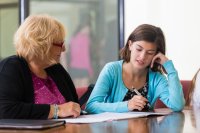How To Maximize the Benefits of Individual Reading Conferences
Listening to a student read is great formative assessment that gives the teacher a clear sense of how to help them improve.
Your content has been saved!
Go to My Saved Content.The opportunity to meet one-on-one with a student is a rarity for many teachers. In Education Week’s “Six Tips for Making the Most of One-on-One Reading Conferences,” early elementary teacher Justin Minkel describes how he ensures that the time is well spent.
Think about the schedule: While he advises “quality over quantity,” Minkel says there must be adequate time to devote to students who are struggling. Equity doesn’t mean spending the same amount of time with each student—determine who has the greatest needs and spend more time with them. “I would rather have 10 or 15 meaningful conferences than the satisfaction of putting a check mark next to all 25 kids’ names for meetings that were rushed or superficial,” he writes.
Start with a strength: Begin the conference by allowing the student to read for a couple minutes and then compliment them on one strength you notice, Minkel says: “Be specific. Point out the way the reader made an insightful connection, reread a part that confused her, or changed her voice when the grumpy duck was talking.” Follow that with a strategy the student could use to improve. Help students develop a growth mindset by reminding them that they are succeeding while also offering tips to get better.
Test the theory: While a student may say he understands your instruction, the proof is in the demonstration, Minkel says. Having a student perform the action during the conference can show teachers if they need to follow up. Checking for comprehension is also important, Minkel writes. Find out what students really comprehend by “asking simple questions like, ‘What happened in this story?’ or, for nonfiction, ‘What did you learn from this book?’”
Revisit the findings: Use what you learn in the conferences to change your teaching practices. Gathering feedback about what works—and what doesn’t—is only useful if you apply that knowledge to future lessons. Refer to your notes from prior conferences and check for progress with each student. “The time we spend gathering data is only useful if we actually use the data to make kids better readers,” Minkel writes.
Take a whole-child approach: Ask questions outside of the reading assignment to find out how a student is doing in and out of class. “Taking that half-minute to ask how students are doing can convey that we care about them as human beings, not just as a collection of reading levels and test scores,” Minkel says. “Over time, those little human moments can strengthen, reinforce, or repair the relationship at the heart of teaching.”
